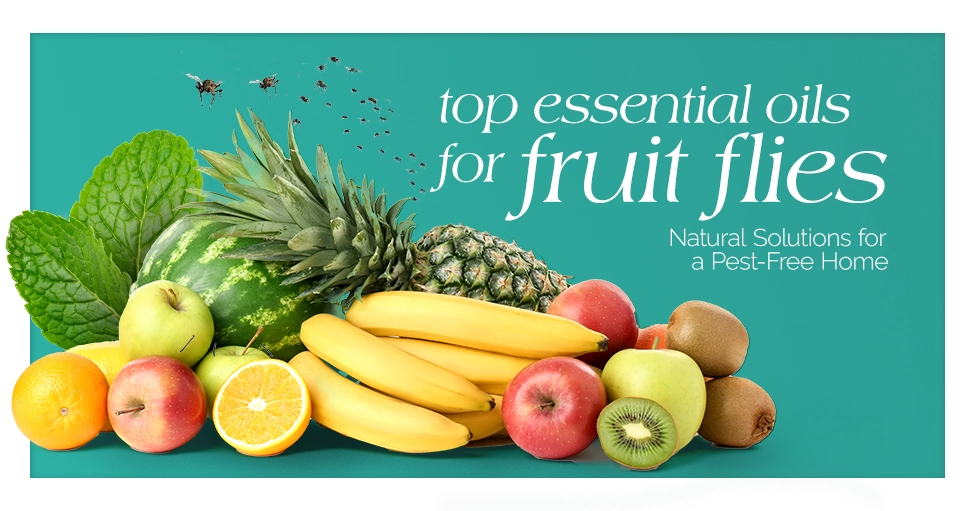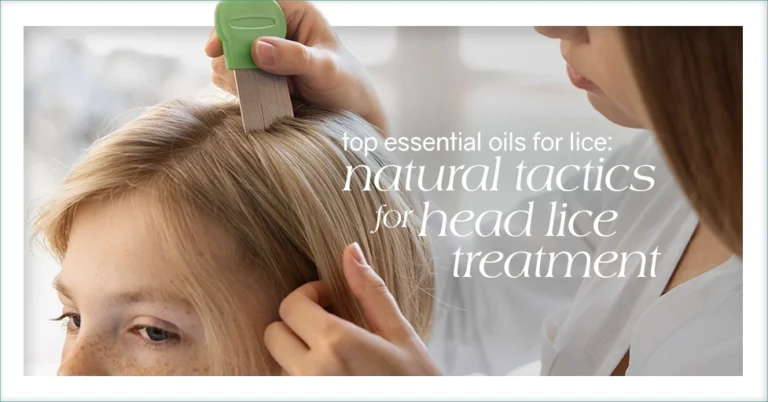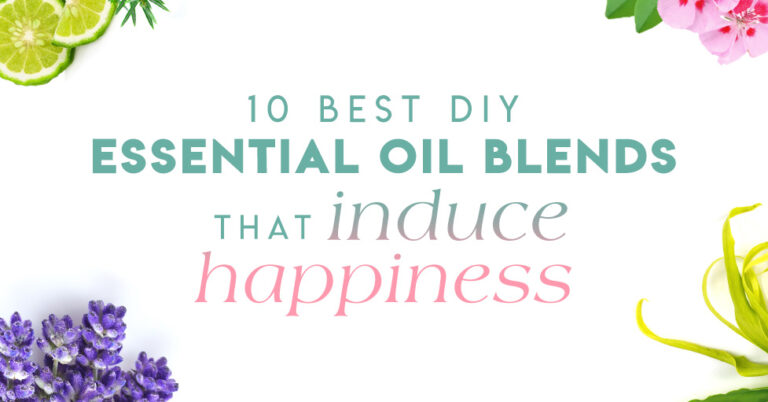Top Essential Oils for Fruit Flies: Natural Solutions for a Pest-Free Home
Tired of fruit flies in your kitchen? Essential oils for fruit flies can help you keep these pests away. In this guide, you’ll learn which essential oils work best and how to use them.
Say Goodbye to Fruit Flies with Essential Oils!
Why Essential Oils Work Against Fruit Flies
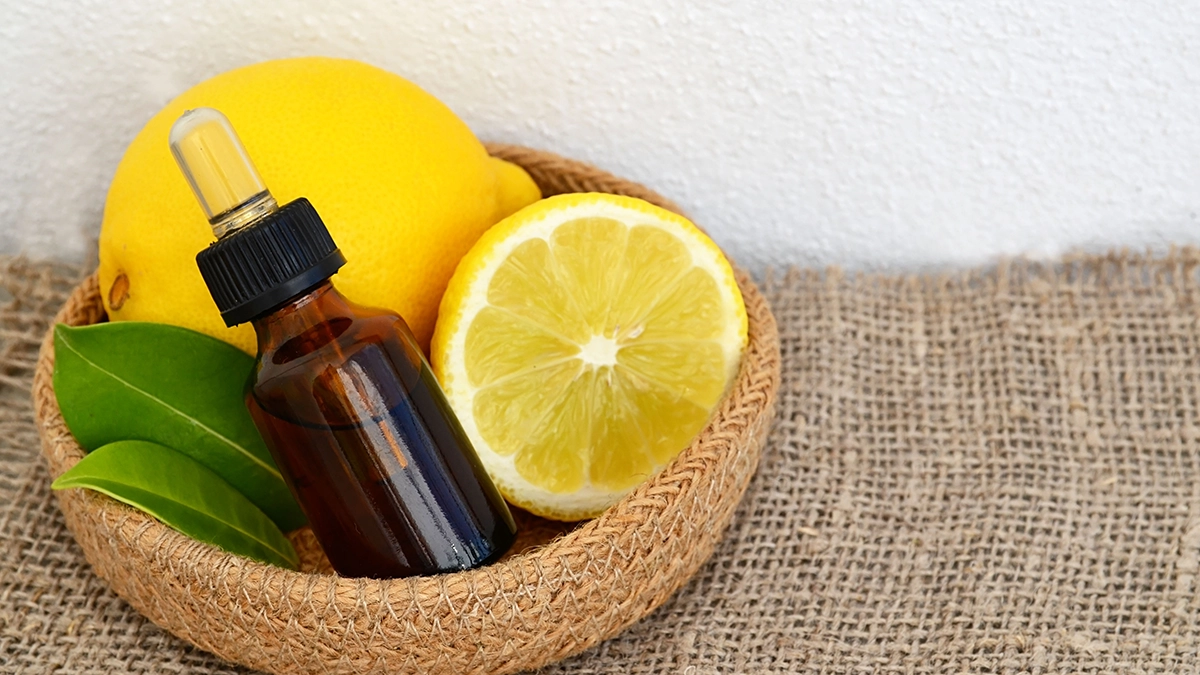
Essential oils work wonders against fruit flies due to their potent natural compounds that these tiny pests find incredibly off-putting. Certain oils like peppermint, lavender, and eucalyptus emit strong scents that create an inhospitable environment for fruit flies, making it difficult for them to thrive or even survive. For instance, lavender oil, known for its pleasant aroma, effectively deters these insects, providing a dual benefit of a sweet-smelling home and a fly-free environment.
One of the most efficient ways to disperse these essential oils is through nebulizing diffusers. These devices break down the oils into fine particles, creating a robust aromatic atmosphere that fruit flies find unbearable.
This continuous diffusion ensures that the scent lingers in the air, making your home less inviting to fruit flies and other pests. Imagine walking into your kitchen, greeted by a delightful scent that simultaneously keeps these pesky insects fly at bay!
Best Essential Oils to Repel Fruit Flies
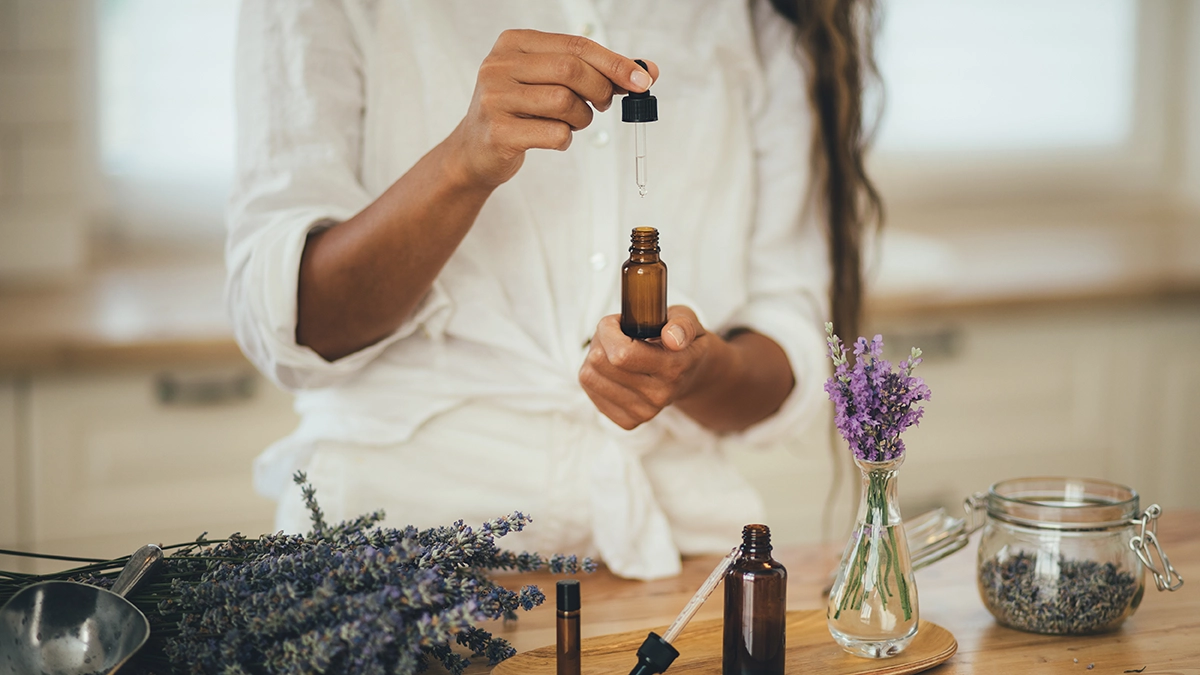
When it comes to repelling fruit flies, not all essential oils are created equal. Some oils are particularly effective due to their strong scents and specific compounds. Among the best are:
- Peppermint
- Lavender
- Eucalyptus
- Citrus oils
- Thyme
- Tea Tree
These oils offer a natural, non-toxic way to keep fruit flies out of your home while also providing other benefits like pleasant aromas and even therapeutic effects.
Each of these oils has unique properties that make them especially good at deterring fruit flies. In the following subsections, we’ll dive deeper into why these specific oils are so effective and how you can use them to protect your home.
From the invigorating scent of peppermint to the soothing aroma of lavender, these essential oils are your best allies in the fight against fruit flies.
Peppermint Oil
Peppermint oil stands out as one of the most effective essential oils for repelling fruit flies. Its strong scent disrupts the sensory receptors of these pests, making your home an unfriendly environment for them. Research has shown that peppermint oil can achieve 100% repellency against Drosophila suzukii, keeping the flies at bay for up to six days after application.
Apply peppermint oil in areas where fruit flies are commonly found for best results. Create a spray by mixing a few drops of peppermint oil with water in a spray bottle. Spritz this mixture around your kitchen, especially near fruit bowls and trash cans.
You can also soak cotton balls in peppermint oil and place them in strategic locations. This approach ensures that the strong, minty aroma permeates your home, driving away fruit flies and deterring their return1.
Lavender Oil
Lavender oil is another excellent choice for repelling fruit flies. Its soothing aroma creates a relaxing ambiance and serves as an effective deterrent for these pests. The pleasant scent of lavender oil masks the smell of rotting fruits, which attracts fruit flies, thus keeping them away.
Add a few drops of lavender oil to a spray bottle filled with water and lightly mist areas where fruit flies are active. Place cotton balls soaked in lavender oil near potential breeding sites for effective results. This method not only helps to repel fruit flies but also leaves your home smelling fresh and calming.
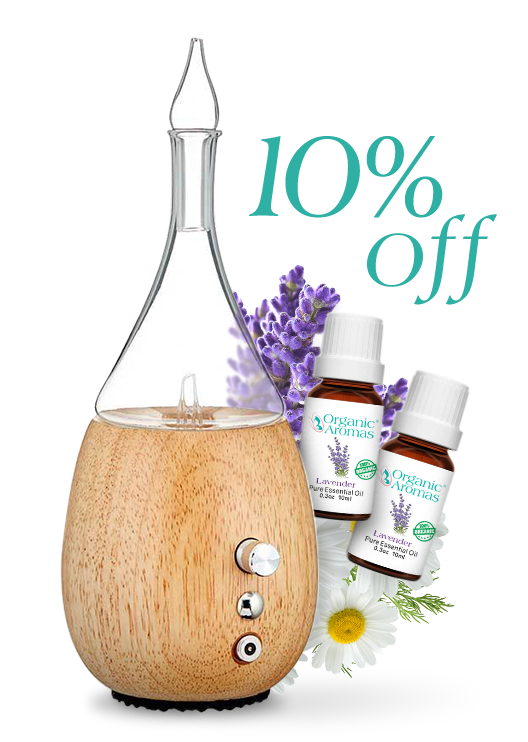
Join Now and Get a Coupon for 10% Off!
Eucalyptus Oil
Eucalyptus oil’s potent scent makes it a formidable natural deterrent against fruit flies. The strong aroma of eucalyptus oil disrupts the sensory pathways of these pests, making your home an uninviting environment for them. Its natural pest control properties extend beyond just fruit flies, offering a broader protection spectrum against various insects.
Soak cotton balls in eucalyptus oil and place them near fruit bowls, garbage cans, and other areas where fruit flies are frequently seen. Diffusing eucalyptus oil in your home creates an aromatic barrier that keeps these pests at bay.
This dual approach maximizes coverage and effectiveness in repelling fruit flies.
Citrus Oils
Citrus oils, such as those derived from lemons, oranges, and grapefruits, are particularly effective against fruit flies due to the presence of limonene. This compound has both repellent and toxic effects on fruit flies, making citrus oils a powerful tool in your pest control arsenal. The fresh, invigorating scent of citrus oils not only repels fruit flies but also leaves your home smelling clean and vibrant.
Add a few drops of citrus oils to a spray bottle filled with water and mist areas where fruit flies are active. Placing citrus peels near fruit bowls or in trash cans enhances the repellent effect. This natural, dual-action method will keep your home free from fruit flies while filling it with a delightful citrus aroma2.
Thyme Oil
Thyme oil is another highly effective essential oil for repelling fruit flies, particularly due to its strong antimicrobial and insect-repelling properties. The active component thymol, found in thyme oil, is known for its ability to deter pests by affecting their nervous systems, making it hard for fruit flies to linger in treated areas.
To use thyme oil, you can create a simple spray by mixing a few drops of the oil with water in a spray bottle. Apply this mixture to areas where fruit flies congregate, such as near fruit bowls, windows, and garbage bins. You can also place cotton balls soaked in thyme oil around your kitchen or in areas where flies are frequently seen.
This versatile oil not only helps repel fruit flies but also works against a variety of other household pests, providing a broader spectrum of protection while imparting a fresh, herbal scent to your home3.
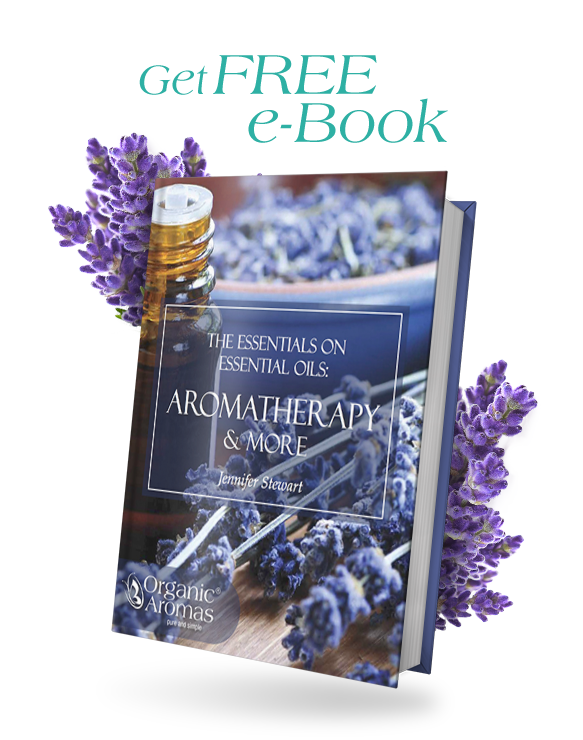
Sign Up to Get Your FREE
e-Book Here…
Tea Tree Oil
Tea tree oil, widely known for its antimicrobial properties, is also an effective natural repellent against fruit flies. Its strong, medicinal scent disrupts the sensory receptors of these pests, making your home an inhospitable environment for them. Tea tree oil has been used for its ability to kill bacteria and fungi, and this same potency helps keep fruit flies at bay.
To use tea tree oil, mix a few drops with water in a spray bottle and spritz it in areas where fruit flies are common, such as around your kitchen, windows, and trash cans. You can also place cotton balls soaked in tea tree oil near fruit bowls or any fly-prone spots. The fresh, crisp scent not only repels fruit flies but also acts as a natural disinfectant, helping to keep your kitchen clean and free of pests4.
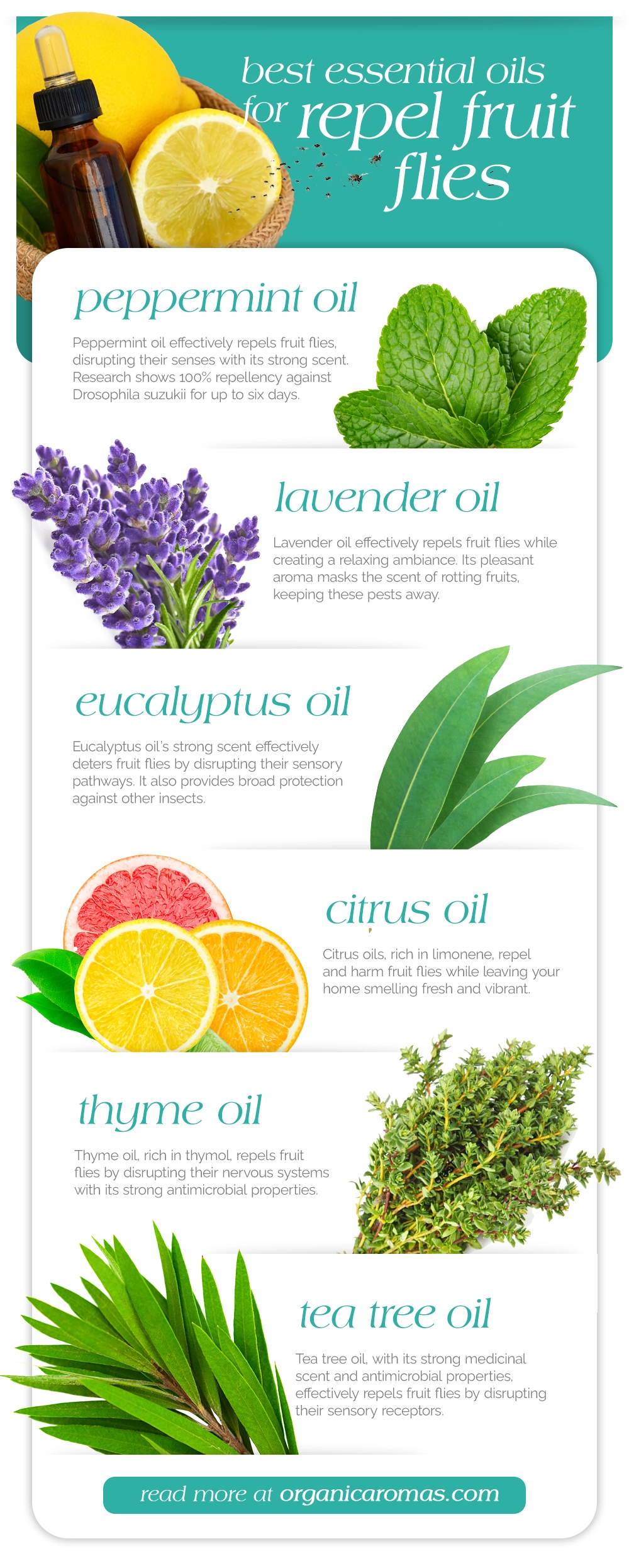
How to Use Essential Oils for Fruit Fly Control
Choosing the right essential oils is just part of the solution. Knowing how to apply them effectively ensures a fruit fly-free home. There are several methods to use essential oils, including creating DIY sprays, using nebulizing diffusers, and employing the cotton ball method. Each technique has its benefits and can be tailored to your specific needs and home environment.
The following subsections detail these methods. Whether you prefer a quick spray, a continuous aromatic barrier, or strategically placed cotton balls, these solutions will help keep your home pest-free.
DIY Essential Oil Spray
A DIY essential oil spray effectively repels fruit flies. Start by filling a spray bottle with water and adding a few drops of your chosen essential oil, such as lemongrass or peppermint. For added efficacy, you can include a splash of white vinegar, which fruit flies also find repellent.
Mist the spray around your kitchen, especially near fruit bowls, garbage cans, and sinks. This method not only repels fruit flies with strong natural scents but also provides a refreshing, clean aroma in your home.

Sign Up to Get Your FREE Essential Oils e-Book Here
Using Nebulizing Diffusers
Nebulizing diffusers effectively disperse essential oils throughout your home. Pressurized air in these devices creates a fine mist of essential oil, ensuring a strong aroma without dilution. Organic Aromas’ nebulizing diffusers, featuring Bluetooth technology, allow convenient and precise aroma control, ideal for continuous pest control.
Running a nebulizing diffuser daily maintains a strongly aromatic environment that is hostile to fruit flies. This method repels pests and offers the therapeutic benefits of essential oils.
Cotton Ball Method
The cotton ball method is a simple yet effective way to control fruit flies with essential oils. Simply soak cotton balls in your chosen essential oil and place them in areas where fruit flies are active. This method works well near fruit bowls, garbage cans, and entry points.
Refresh the cotton balls with a few drops of oil every few days to maintain potency. This simple technique ensures that the strong scents of the oils continuously deter fruit flies from invading your space.
Combining Essential Oils with Other Natural Methods
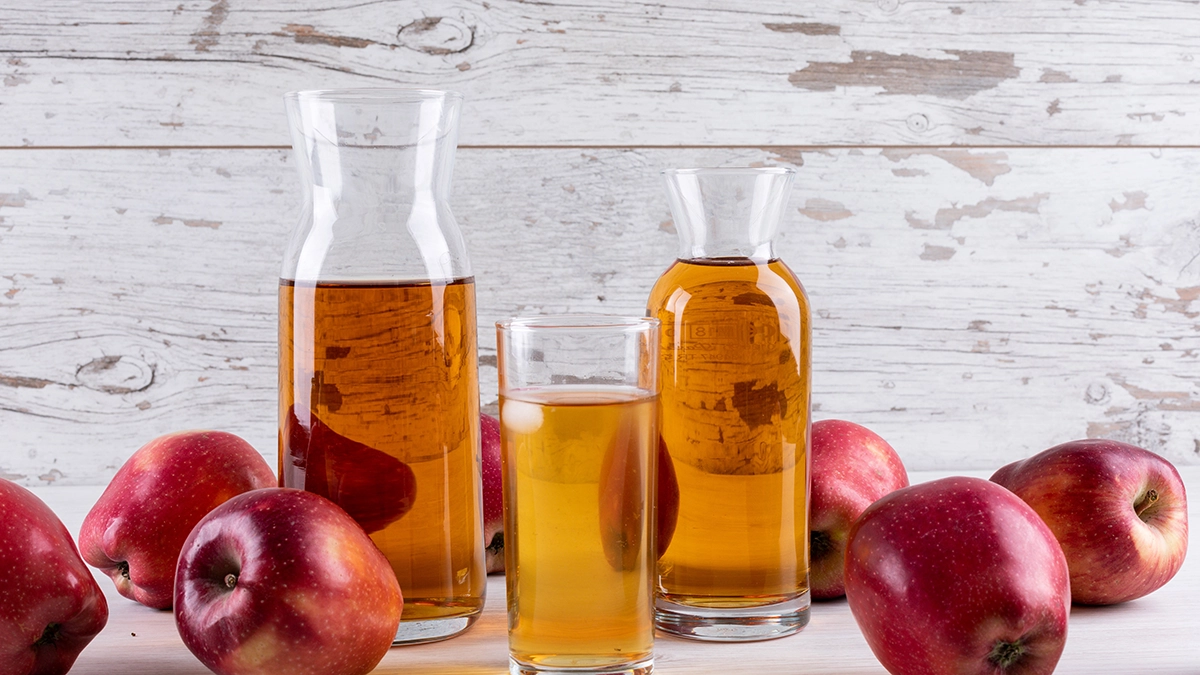
While essential oils are highly effective on their own, combining them with other natural methods can enhance your pest control strategy. Integrating essential oils with cleanliness and homemade traps creates an effective and environmentally friendly pest control approach.
The following subsections explain how to use apple cider vinegar traps and maintain a clean kitchen to maximize efforts in keeping fruit flies at bay. These additional methods complement the use of essential oils and help ensure a holistic pest control solution.
Apple Cider Vinegar Traps
Apple cider vinegar traps effectively capture and kill fruit flies. The sweet scent of apple cider vinegar attracts fruit flies, drawing them into the trap where they become stuck and perish. Mix apple cider vinegar with a few drops of dish soap in a shallow dish to make a trap. The dish soap reduces the surface tension of the water. As a result, the flies sink and drown.
Place these traps near areas where fruit flies are most active, such as near fruit bowls or garbage cans, for enhanced efficacy. Combine this method with essential oils by adding a few drops of oil to the vinegar mixture, creating a dual-action fruit fly trap that attracts fruit flies and is effective for attracting fruit flies.
Keeping Your Kitchen Clean
A clean kitchen is crucial for preventing fruit fly infestations. Fruit flies are attracted to sugary residues, rotting fruit, and other food waste, so keeping your kitchen clean can significantly reduce their numbers. Regularly disposing of garbage, wiping down surfaces, and promptly removing overripe or rotting fruit are essential steps in controlling fruit fly populations. In addition, keep your kithcen dry and free of humidity and moisture is a bonus for repelling fruit flies.
Ensure your garbage cans are sealed and promptly clean up any spills or crumbs. Combining these cleanliness practices with essential oils creates an inhospitable environment for fruit flies.
Benefits of Holistic Approaches to Pest Control
Holistic pest control strategies offer benefits beyond merely getting rid of pests. Using natural methods like essential oils reduces reliance on synthetic chemicals, promoting a healthier and safer home environment. These approaches help maintain ecological balance by preserving beneficial insects that are crucial for a healthy ecosystem.
Additionally, essential oils deter pests and enhance indoor air quality through natural purification properties. This multi-faceted approach ensures that your home remains a pleasant and safe place for your family, free from the harmful effects of conventional pest control methods.
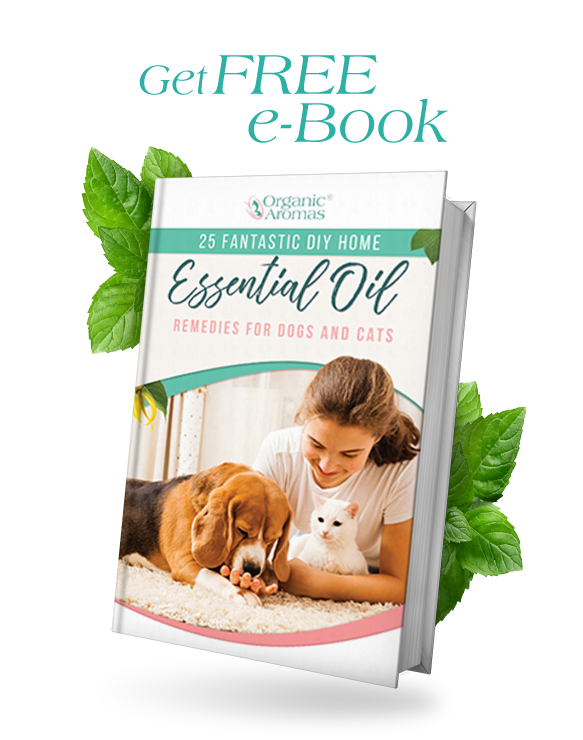
Sign Up to Get Your FREE Pets
e-Book Here…
Precautions When Using Essential Oils
Although essential oils offer a safer alternative to synthetic chemicals, use them with caution. Essential oils are potent and can cause adverse reactions if not used properly. Perform a patch test before using a new essential oil to check for allergic reactions. Be mindful of proper dilution, especially when diffusing oils, to avoid respiratory irritation.
Store essential oils away from heat sources and out of reach of children and pets to prevent accidental ingestion or exposure. Consult a healthcare professional before using essential oils if you have respiratory conditions or other health concerns. Following these precautions allows you to safely enjoy the benefits of essential oils without unwanted side effects.
Consult Healthcare Professionals
Consulting a healthcare professional before using essential oils is crucial, especially for individuals with underlying health conditions or allergies as well tiny children, the eldery and even your precious fur and feather babies! Essential oils can have varying effects on different people; personalized advice from a healthcare provider ensures safe and effective use.
Healthcare professionals guide which essential oils are safe to use and how to use them properly to avoid adverse reactions. This step is particularly important for vulnerable populations, such as children and pets, to prevent potential health risks.

Join Our Exclusive Member Club to get Big Discounts!
Wrapping Up: The Power of Essential Oils for a Fruit Fly-Free Home
The biggest takeaway is that essential oils offer a powerful and natural solution for repelling fruit flies and maintaining a pest-free home. By using oils like peppermint, lavender, eucalyptus, thyme and citrus, you can create an inhospitable environment for these pests while enjoying the pleasant aromas and therapeutic benefits of the oils. Combining these oils with other natural methods, such as apple cider vinegar traps and maintaining a clean kitchen, enhances your pest control strategy and ensures a holistic approach.
Embracing these natural solutions not only helps you get rid of fruit flies but also promotes a healthier and safer home environment. So, gear up with your favorite essential oils and take the first step towards a pest-free, aromatic haven.
Frequently Asked Questions
What essential oil do flies hate?
Flies absolutely hate lavender, eucalyptus, peppermint, and lemongrass essential oils. Spraying these around your home not only freshens the air but also keeps those annoying flies at bay!
What are the best essential oils to repel fruit flies?
To keep fruit flies at bay, try using peppermint, lavender, eucalyptus, or citrus essential oils. Their strong scents work wonders in repelling these pesky insects!
How do I make a DIY essential oil spray to repel fruit flies?
You can easily make a DIY essential oil spray by filling a spray bottle with water, adding a few drops of lemongrass or peppermint essential oil, and a splash of white vinegar for extra effectiveness. Just give it a good shake before using!
Can I use essential oils safely around children and pets?
Absolutely, you can use essential oils around children and pets, but it’s crucial to do so safely. Pets and children have smaller bodies, and their organs may process the organic chemicals in essential oils slowly or differently. Always dilute them properly, conduct patch tests, and keep them stored out of reach to avoid any accidents.
How do nebulizing diffusers help in repelling fruit flies?
Nebulizing diffusers are great for repelling fruit flies because they create a fine mist of essential oils that makes the space less inviting for these pests. With their continuous diffusion, they keep the aroma strong and effective.
- Renkema, J., Wright, D., Buitenhuis, R., & Hallett, R. (2016). Plant essential oils and potassium metabisulfite as repellents for Drosophila suzukii (Diptera: Drosophilidae). Scientific Reports, 6
- Papanastasiou, S., Bali, E., Ioannou, C., Papachristos, D., Zarpas, K., & Papadopoulos, N. (2017). Toxic and hormetic-like effects of three components of citrus essential oils on adult Mediterranean fruit flies (Ceratitis capitata). PLoS ONE, 12.
- Wu, V., 2022. Development of Chitosan Encapsulated Thyme Essential Oil as an Alternative Fruit Fly Repellent for Household Use. 2022 IEEE Integrated STEM Education Conference (ISEC), pp. 201-201.
- Benelli, G., Canale, A., Flamini, G., Cioni, P., Demi, F., Ceccarini, L., Macchia, M., & Conti, B., 2013. Biotoxicity of Melaleuca alternifolia (Myrtaceae) essential oil against the Mediterranean fruit fly, Ceratitis capitata (Diptera: Tephritidae), and its parasitoid Psyttalia concolor (Hymenoptera: Braconidae). Industrial Crops and Products, 50, pp. 596-603.

